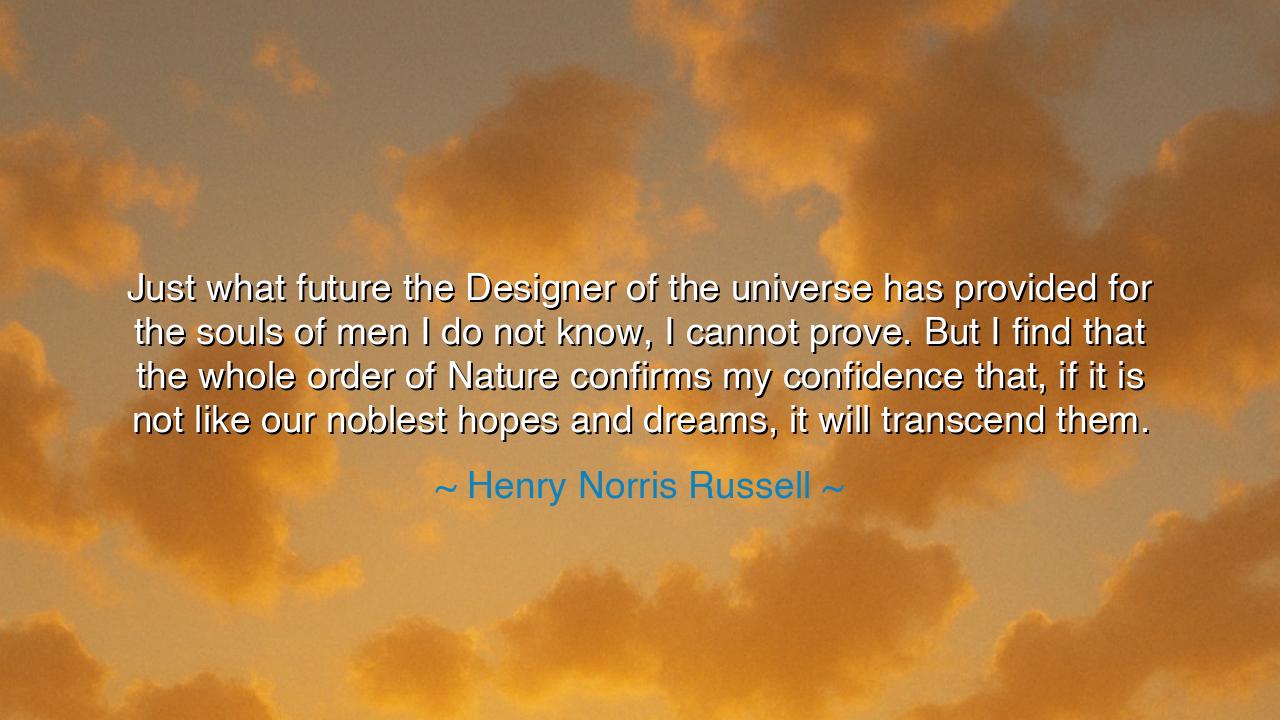
Just what future the Designer of the universe has provided for
Just what future the Designer of the universe has provided for the souls of men I do not know, I cannot prove. But I find that the whole order of Nature confirms my confidence that, if it is not like our noblest hopes and dreams, it will transcend them.






"Just what future the Designer of the universe has provided for the souls of men I do not know, I cannot prove. But I find that the whole order of Nature confirms my confidence that, if it is not like our noblest hopes and dreams, it will transcend them." These words from Henry Norris Russell speak to the mysterious and awe-inspiring nature of the universe, and the deep sense of faith and trust in the greater plan that governs existence. Russell, in his reflection, acknowledges the limits of human knowledge—recognizing that we cannot see or prove the future that awaits humanity. Yet, he expresses confidence in the order of the universe, trusting that the future of mankind, though uncertain, will not merely meet our greatest hopes, but will surpass them in ways beyond our imagination. This is a message of optimism and faith, rooted in the belief that there is a greater force at work, guiding humanity toward a future that we can only dream of.
In the ancient world, the question of humanity's future was one that stirred the minds of philosophers and prophets alike. The Greeks, with their rich philosophical traditions, often sought to understand the nature of fate and destiny. Socrates, for instance, believed that while the individual’s future was largely shaped by choices and virtue, there was still a divine plan beyond human comprehension. His life and teachings suggested that while we cannot know the precise course of our future, we can act with virtue, trusting that the greater design of the universe will guide us toward the fulfillment of our highest potential. Similarly, Plato spoke of the philosopher-king, a leader who would guide society according to the truth that transcends ordinary knowledge—an idea that echoes Russell’s confidence in a future that might transcend our noblest hopes.
The ancient Romans, too, had their understanding of fate and the divine. The poet Virgil, in his Aeneid, told the story of Aeneas, a man whose destiny was written in the stars, a future that would lead him to found the Roman Empire. Aeneas, though he did not know the exact outcome of his journey, trusted that the divine forces guiding him would ultimately lead to something greater than he could understand. Just as Virgil’s hero had to trust in the unseen hand that shaped his destiny, Russell echoes this sentiment by expressing faith in a future for humanity that is guided by a divine intelligence—an intelligence that we may not fully comprehend, but one that is imbued with the order and purpose of the universe itself.
The Hebrew Bible, too, is replete with stories of faith and trust in the divine plan. Abraham, the patriarch of three great religions, was asked by God to leave his homeland and journey to an unknown land, without knowing what the future would hold. Abraham’s obedience and faith were rewarded, and his descendants became a great nation. Like Abraham, who trusted in God’s plan despite the uncertainty of his journey, Russell’s reflection encourages us to trust in the greater design of the universe, even when the future remains hidden from our eyes. Faith, Russell suggests, is not about knowing the future, but about trusting that there is a plan, one that might even exceed our highest dreams.
Consider the example of Marie Curie, the pioneering scientist who discovered the elements radium and polonium. Curie did not know the full extent of the impact her discoveries would have on the future, nor did she understand the complexities of the atomic world she was unlocking. But Curie had faith in the scientific method and in the idea that, by pursuing knowledge, humanity could achieve progress and understanding that would surpass its current state. Her life’s work exemplifies the belief that, although we cannot know the full extent of the future, we can trust that the path forward is one of discovery and growth—and that this journey, though uncertain, will ultimately transcend our current limitations.
The lesson that emerges from Russell’s words is a call to embrace uncertainty with a spirit of optimism and faith. We may not be able to see the future or predict its course, but we must trust that the order of nature and the design of the universe will ultimately lead us to something greater than we can imagine. This is a message of hope—a belief that, even when we are faced with struggle and adversity, the universe is working in our favor, shaping us toward a future that is far more magnificent than we could ever envision. Just as Socrates embraced uncertainty with wisdom, or Abraham walked into the unknown with faith, we too must learn to move forward in life with the confidence that, though we cannot see the full picture, the universe has a plan for us that will transcend our greatest hopes.
In practical terms, this means that we must act with trust in the unseen forces that guide us. Whether in our personal lives, our work, or our relationships, we must move forward with the understanding that we are part of something greater than ourselves. Let us focus not on knowing every step of the journey, but on doing our best in each moment, knowing that the future, though unknown, is a journey toward growth, understanding, and fulfillment. In embracing the uncertainty of life, we learn to live with faith, trusting that the universe will always lead us toward a future greater than we can imagine.






AAdministratorAdministrator
Welcome, honored guests. Please leave a comment, we will respond soon